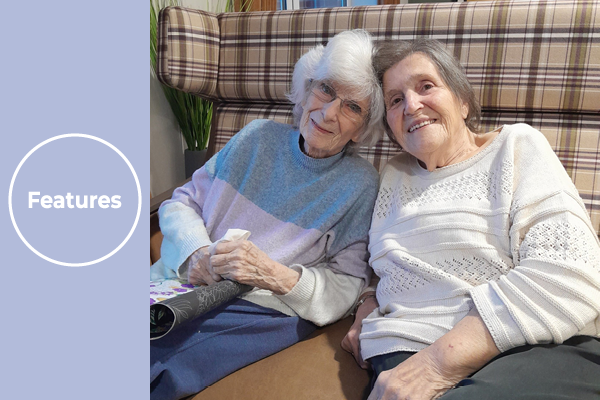You’ve done it – you’ve made the leap to move into full-time residential care. The first thought is probably “What’s next?” with a mixture of worry and anxiety attached to it. Rest assured, settling into a new home is not easy for anyone, no matter the stage of life. Whether it’s your first time away from your parents, or entering into full-time residential care, the nerves are normal and part of stepping into a new chapter of your life. At Glenholme we aim to make the experience as enjoyable and seamless as possible, but if you’re wondering about how you could prepare for moving day? Wonder no more – here are six things to remember before moving into residential care.

Check What’s Included in the Service You’ve Paid for.
Ensure you’ve dotted your i’s and crossed your t’s and know what to expect from the care that you or a loved one will receive. We understand that there may be an overload of information in a transition like this. At times too much for you to remember, and that’s normal. It may sound strange but going back to review all the information that you were given about the package you’re paying for is key.
Having an understanding of what you expect from us your care providers but it’s also a way of giving you and your loved ones peace of mind from any unexpected surprises. Our staff will be on hand to walk you through every step and provide clarity to the best of their abilities.

Familiarise Yourself with the Setting Before You Arrive
Moving into residential care can be an exciting opportunity to be part of a wider community of people and create new relationships and memories, whilst receiving the round-the-clock attention and care you or a relative requires. A great place to start is by familiarising yourself with the area before you move in. Taking a few trips with loved ones to go around the local area. Getting fresh air and seeing the wider surroundings of where the home is located can be a great way to feel more accustomed to the home.
We advise visiting local shops, cafés and parks with relatives, who will get a first-hand sense of the area where the future care home resident will reside. Go around as often as you feel necessary, particularly if you’re not local.

There’s No Place Like Home
There really is no place like home, so don’t be afraid to pack whatever you or your relative may want to feel more at home. This is crucial because it’s the things in our personal space that allow us to have a sense of ownership. It won’t feel like just a room. It’ll be his or her personal space to rest and relax. Another consideration may be to bring small items and other mementoes that can be a great source of comfort, especially for those who may be living with Dementia or Alzheimer’s.
It’s widely known that having a memory box or book specifically created for someone who suffers from any neurological disease that causes memory loss helps act as a bridge to the past, evoke emotions to help recall more memories and orient them to themselves, their identity, and purpose. For more on how to make a memory box/book for a person with Dementia, resources are shared at the end of this article.

Changing Your Address
This aspect is administrative, so it may require some foreplanning and time to complete. However, it’ll save you so much hassle once it’s done. It’s key to retain some level of normalcy whilst in full-time care. That includes receiving letters and relevant updates to prevent the feeling of isolation or needless dependency. The best course of action is to first create a checklist of all the relevant banks, businesses and people who need to know that you or your relative have moved.
Sending letters to personal friends and family to inform them of the new transition with a new address can be really helpful to adjust and still feel a personal connection. Lastly, make sure the future resident has changed their GP if applicable, and has gotten connected to their nearest pharmacy.

Keep Communicating
This final step is incredibly important for your wellness and for the smoothness of anyone’s transition into full-time residential care. We encourage you to speak to people around you about your feelings towards the move. Even once you’ve moved in, don’t be shy to speak up if you’re still finding it hard, we find that it’s extremely helpful to speak to the team who’ll be administering care for you or a loved one. If we feel that you’ll benefit from external resources to help cope, our team will point you in the right direction.

Dietary and Food Requirements
If you have special dietary needs or allergies that need to be catered for, make sure the care home staff are aware. If the requirements are very specific, it might be a good idea to compile a list of what can and cannot be eaten in advance to avoid any issues and potential health risks. At Glenholme, we believe diet and nutrition are a vital part of our resident’s well-being; providing this list will allow us to prescribe the best possible care.
Those are the six things to remember before moving into a care home. If you find this article helpful, let us know in the comments and share it with someone whom you think it may benefit. At Glenholme we are passionate about the care we provide and if you’d like to know more about our elderly home services click here to find out or email us at enquiries@glenholme.org.uk
Resource: Guide to Building Memory Boxes for People with Dementia



0 Comments